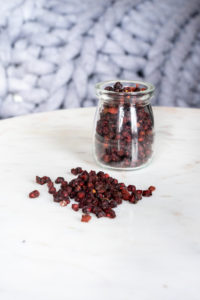WHAT ARE ADAPTOGENS?
And How Do They Relate To Traditional Chinese Medicine?

Adaptogens are a great way to help your body manage both physical and mental stress — and they’re all the rave in health and wellness communities. So, are they just another passing trend or do they really live up to the hype? Here’s what you need to know about these natural herbal remedies so you can harness the benefits.
What Is an Adaptogen?
Adaptogens are a select group of natural herbs that help our bodies combat and resist stress, be it physical, biological, or chemical. Adaptogens help us cope with the every day stressors and fatigue by mitigating their effects on our bodies.
Each adaptogen combats different ailments with their natural health benefits. However, adaptogens aren’t considered a “drug” in that they don’t have a specific physiological effect; rather, they help your body achieve an overall sense of balance and stability.
Essential Adaptogens You Need to Know
So, what kind of adaptogens are out there, and which ones do you really need to know? Here’s a list of the most common and essential adaptogens available and their purported health benefits:
- Ashwagandha: Also called Indian ginseng, this ancient herb is known to lower blood sugar and cortisol levels and fight anxiety and depression.

- Astragalus: This Chinese herb boosts your immune system, and has strong antiviral and antibacterial properties, too.
- Holy basil: Also known as tulsi, this plant alleviates inflammation by reducing bloating for those suffering from gut issues.
 Lion’s mane: “Hericium erinaceus” is a mushroom that reduces inflammation and offers cognitive and heart health benefits.
Lion’s mane: “Hericium erinaceus” is a mushroom that reduces inflammation and offers cognitive and heart health benefits. - Maca: A plant native to Peru, this plant gives you energy and stamina, reduces anxiety, and enhances your sex drive and fertility.
 Reishi: This mushroom is known to reduce blood sugar levels, and was believed by the Chinese to improve willpower and relieve tension and stress.
Reishi: This mushroom is known to reduce blood sugar levels, and was believed by the Chinese to improve willpower and relieve tension and stress. - Rhodiola: This special herb reduces stress and adrenal fatigue, and should not be taken before going to bed as it may keep you at night.
 Schisandra: Also called the “five flavor fruit,” this berry increases physical performance, endurance, and aids the liver by protecting it from poisons and liver disease.
Schisandra: Also called the “five flavor fruit,” this berry increases physical performance, endurance, and aids the liver by protecting it from poisons and liver disease. - Shatavari: This herb acts as a support for the reproductive and digestive systems, and is said to help women young and old transition through all of life’s phases.
 Eleuthero: This root is said to boost the immune system, prevent colds, increase the appetite, and aid with heart and blood conditions.
Eleuthero: This root is said to boost the immune system, prevent colds, increase the appetite, and aid with heart and blood conditions.
This isn’t an exhaustive list, but it gives you an idea of what’s available and can help you dive deeper into the world of adaptogens. Now, you might be wondering the best way to consume them, so we’ve included some ideas and tips.
Best Ways to Incorporate Adaptogens into Your Diet
It’s not uncommon to overuse adaptogens, so it’s important to determine how much and how often to consume these supplements so that you don’t counterbalance their benefits. Once you’ve determined what dosage is best for you, you can start experimenting with how you take them throughout the day.
One great way to incorporate them into your diet is to mix them with foods or beverages you already enjoy. For instance, if you’re a coffee drinker, you could add powdered reishi or other mushroom extracts into your cup, and mix your supplements with your morning or afternoon cup of joe. Some other popular methods include mixing these herbs into a smoothie, latte, tea, or even your homemade nut milk! If you want more edible options you can use holy basil (tulsi) to make a pesto, or add codonopsis or astragalus to rice.
 One great way to get a daily, balanced version is through a tincture, like readywell . Of course, there’s nothing wrong with just swallowing them down with water, too. You do you. What’s important is that you learn the best way to incorporate these natural healers into your daily routine to reap the maximum benefit.
One great way to get a daily, balanced version is through a tincture, like readywell . Of course, there’s nothing wrong with just swallowing them down with water, too. You do you. What’s important is that you learn the best way to incorporate these natural healers into your daily routine to reap the maximum benefit.
Adaptogens in Traditional Chinese Medicine
These nutritious herbs are experiencing a renaissance of sorts today, but they’ve been around for centuries. Historically, their roots can be traced back to the Traditional Chinese and Ayurvedic medicine systems, which date back to approximately 3,000 B.C. Chinese royalty valued these herbs and commissioned expeditions into Siberia to collect rhodiola and other mushrooms and plants for the royal family.
By 220 A.D., the Ayurvedic and Chinese collectively identified over 600 adaptogenic herbs from both regions. Eventually, Shaolin monks would use these herbs to help them meditate, and even vikings were said to consume them as tonics to enhance their physical strength. Their use throughout history as performance enhancers and stress relievers has brought them back into the limelight and popularized their use among traditional medicine enthusiasts and health gurus.
Do you have any questions or comments about adaptogens? Schedule a virtual consultation with one of our Eastern medicine experts who will listen to your concerns and goals and can help determine the best natural solution for you.
Newer
All-Natural Chinese Remedies for Common Childhood Ailments
Older
What You Need to Know about Tai Chi and Qigong
Comments (0)
Leave a reply
You must be logged in to post a comment.




